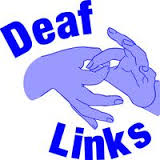Challenge sponsor
 Deaf Links is a co-production organisation which was set up by deaf and deafblind people as an organisation that truly meets their needs and involves them in all aspects of service planning and development. The vision of deaf and deafblind people in Tayside is to develop services, promote activities and learning that truly reflect the needs of deaf people in the area that will empower them to become equal, independent and active members of the communities in which they live. Deaf Links provides advocacy, advice, information, learning opportunities, employability, volunteering and support to local deaf and deafblind people and demand is increasing for their services all the time.
Deaf Links is a co-production organisation which was set up by deaf and deafblind people as an organisation that truly meets their needs and involves them in all aspects of service planning and development. The vision of deaf and deafblind people in Tayside is to develop services, promote activities and learning that truly reflect the needs of deaf people in the area that will empower them to become equal, independent and active members of the communities in which they live. Deaf Links provides advocacy, advice, information, learning opportunities, employability, volunteering and support to local deaf and deafblind people and demand is increasing for their services all the time.
Tayside Deaf Hub Community Centre, where Deaf Links is based is the first of its kind in Scotland and is a resource where all members of the wider community are welcome, raising deaf awareness and breaking down barriers with the hearing world.
The Challenge
On a national scale, there is now legislation and strategic drive from Scottish Government to better meet the needs of Deaf and sensory impaired people through the British Sign Language (BSL) (Scotland) Act 2015 and the See Hear Strategy, which are both in process of being implemented at local level across Scotland. This alongside a significantly increasing ageing population who are very much affected by sensory loss, presents an urgent need for awareness raising within the general public and across services both public and private.
Deafness and sight loss are not “sexy” subjects and still have stigma attached to them. They often go un-noticed because they are mostly invisible to anyone other than the person affected. However, the impact on those affected is huge. They face massive communication, access and information barriers which in turn impact significantly on their lives, causing isolation, exclusion, discrimination and health inequalities.
Last year, the Global Health Challenge Team who accepted Deaf Link’s challenge developed a practical training pack called “Open Ears” to be used as a part of basic face-to-face awareness training with medical and frontline staff across a wide range of services. They have since, with Deaf Links, secured a small pot of funding to develop the prototype into a deliverable pack. Along- side this, a sub-group of Dundee Strategic Planning Group for Sensory Services have developed an e-learning training for use with anyone whose job involves interaction with the public.
This year we would like to set the challenge of raising the profile and marketing these training opportunities to public, private and learning agencies, so that it becomes an integral part of University courses for certain schools and induction training for staff and volunteers across our communities. Currently such training is not part of organisational, business or educational learning. How do we change this and make it a part of good practice across the board?